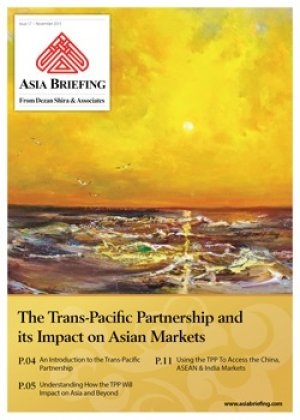Investment Protection in ASEAN – Part 1: The ASEAN Comprehensive Investment Agreement
 By: Dezan Shira & Associates
By: Dezan Shira & Associates
Editor: Alexander Chipman Koty
For companies seeking to expand operations in South East Asia, the region’s rising stature in manufacturing, ICT, and other areas of production remains tempered by regulatory uncertainty. Although legal continuity will likely emerge over the long term, rapidly developing regulatory infrastructure in many of ASEAN’s member states mandates a clear understanding of national policy objectives as well as risk mitigation techniques.
The first in a two part series, this article will assess the protection afforded to investors as part of the agreement. For more information on how the agreement compares to bilateral investment agreements in place between states such as Japan, the United States, and the EU, stay tuned for the second half of this article – to be released within the coming week.
 RELATED: Pre Investment and Market Entry Advisory from Dezan Shira & Associates
RELATED: Pre Investment and Market Entry Advisory from Dezan Shira & Associates
The ASEAN Comprehensive Investment Agreement
The ASEAN Comprehensive Investment Agreement (ACIA) was adopted in 2009 to establish an investment environment based on international best practices. The agreement replaces and builds upon two prior agreements: the ASEAN Investment Guarantee Agreement of 1987 and the ASEAN Investment Area Agreement of 1998. In addition to consolidating these agreements, ACIA makes substantial improvements in the clarification and expansion of investor’s rights.
Investment Protection
ACIA offers clear and broad definitions of “investor” and “investment”, thereby reducing risk and uncertainty for investors and empowering them in the event of disputes. Beyond expansive definitions, ACIA also requires host governments to commit to various forms of investment protection. One such protection is that of fair and equitable treatment – meaning host countries must make decisions based on laws and not arbitrary actions, and gives investors the right to defend themselves with access to lawyers and the right to appeal. The Most-Favoured-Nation (MFN) Treatment clause further guarantees that ASEAN members receive no less favorable rights than any other country.
In addition to guaranteeing fair and equitable treatment and MFN status to investors, host governments must also provide full protection and security to investments at all times, including during riots and insurgencies. In such an event, hosts must compensate losses due to an armed conflict, civil strife, or a state of emergency. ACIA also stipulates that host countries can only expropriate investments under specific conditions, and must compensate investors fairly if carried out. Finally, investors hold the right to make transfers in and out of a country’s territory freely and without delay in a freely convertible currency.
 Related: Foreign Exchange Volatility in ASEAN: Assessing Exposure & Managing Risk
Related: Foreign Exchange Volatility in ASEAN: Assessing Exposure & Managing Risk
Dispute Resolution
Under ACIA, investors have several options to settle disputes with host governments if they believe their rights have been infringed upon. The Investor-State Dispute Settlement (ISDS) mechanism presents three main routes to pursue grievances. One option is to take a claim to the host country’s domestic courts. Should investors desire a more independent third party, they can pursue arbitration through their choice of international court, including the United Nations Commission on International Trade Law (UNCITRAL), the International Centre for Settlement of Investment Disputes (ICSID), and the Regional Centre for Arbitration at Kuala Lumpur, or any other ASEAN regional arbitration center. The opposing parties are also free to choose an alternative mutually agreed upon venue, and are encouraged to settle disputes through mediation and negotiation at any point of the process.
Limits
While ACIA offers a relatively comprehensive array of protections, it still suffers from an element of vagueness. Article 23 offers newer ASEAN members such as Cambodia, Laos, Myanmar, and Vietnam special and differential treatment to apply ACIA’s commitments in line with their respective stages of development. As such, ACIA must be contextualized for each individual member. For example, ACIA states that compensation for expropriation “be equivalent to the fair market value of the expropriated investment immediately before or at the time when the expropriation was publicly announced, or when the expropriation occurred, whichever is applicable”. For a more developed member such as Singapore or Malaysia, this may mean that compensation would be paid for an asset’s value before expropriation. However, for less developed countries like Myanmar and Laos, compensation may be at the time expropriation occurred.
Further Support From Dezan Shira & Associates
Ultimately, the capacity of investors to leverage ACIA investment protections will rely on a firm understanding of the agreement’s application within various ASEAN member states, and the subsequent implementation of investment strategy structured to tap into these intricacies. For more information on how your business can benefit from ACIA, please contact our Market Entry Advisors at www.dezshira.com
|
Asia Briefing Ltd. is a subsidiary of Dezan Shira & Associates. Dezan Shira is a specialist foreign direct investment practice, providing corporate establishment, business advisory, tax advisory and compliance, accounting, payroll, due diligence and financial review services to multinationals investing in China, Hong Kong, India, Vietnam, Singapore and the rest of ASEAN. For further information, please email asean@dezshira.com or visit www.dezshira.com. Stay up to date with the latest business and investment trends in Asia by subscribing to our complimentary update service featuring news, commentary and regulatory insight. |
Annual Audit and Compliance in ASEAN
For the first issue of our ASEAN Briefing Magazine, we look at the different audit and compliance regulations of five of the main economies in ASEAN. We firstly focus on the accounting standards, filing processes, and requirements for Indonesia, Malaysia, Thailand and the Philippines. We then provide similar information on Singapore, and offer a closer examination of the city-state’s generous audit exemptions for small-and-medium sized enterprises.
 The Trans-Pacific Partnership and its Impact on Asian Markets
The Trans-Pacific Partnership and its Impact on Asian Markets
The United States backed Trans-Pacific Partnership Agreement (TPP) includes six Asian economies – Australia, Brunei, Japan, Malaysia, Singapore and Vietnam, while Indonesia has expressed a keen willingness to join. However, the agreement’s potential impact will affect many others, not least of all China. In this issue of Asia Briefing magazine, we examine where the TPP agreement stands right now, look at the potential impact of the participating nations, as well as examine how it will affect Asian economies that have not been included.
 An Introduction to Tax Treaties Throughout Asia
An Introduction to Tax Treaties Throughout Asia
In this issue of Asia Briefing Magazine, we take a look at the various types of trade and tax treaties that exist between Asian nations. These include bilateral investment treaties, double tax treaties and free trade agreements – all of which directly affect businesses operating in Asia.









